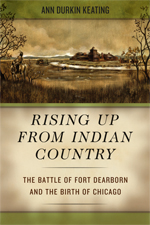| « Criminal Class Press Punks Promote Literacy | Chicago Literary Hall of Fame Celebrates Richard Wright » |
Books Mon Aug 27 2012
Book Review: Rising Up From Indian Country: The Battle of Fort Dearborn and the Birth of Chicago

On August 15, 1812, 95 men, women and children were killed or taken prisoner by 500 Potawatomi warriors a mile outside of U.S. military outpost Fort Dearborn. In later years, the "Fort Dearborn Massacre" became known as a foundational event in the history of Chicago, inspiring an 1893 monument and one of the four stars on the city's flag.
But should we really call it a massacre?
In Rising Up From Indian Country: The Battle of Fort Dearborn and the Birth of Chicago, Ann Durkin Keating revisits the early history of Chicago and the settlement of the surrounding "Indian Country" region to explain the complex chain of events that led to the incident in question. Throughout the book, the North Central College History professor argues that previous historical accounts have oversimplified or ignored the vital role that personal ties and tensions between key figures among the Native American tribes, Europeans, and the newly-established Americans played in the events at Fort Dearborn and across the continent during the War of 1812.
Keating does an excellent job of weaving a compelling narrative out of what could have been a jumbled mess of family trees, tribal ties, and locations. She filters this history through the lens of fur trader John Kinzie. Through his numerous contacts and relationships across all the competing factions, Keating shows, Kinzie inadvertently played a role in shaping the fate of the region simply by trying to preserve his own lucrative business ventures. Her vivid portraits of the constantly-shifting Native American settlements, the intricacies of the regional fur trade, and the mixed-race "metis" communities that emerged from the melding of cultures all demolish the black-and-white "Natives vs. white settlers" narrative that tends to dominate popular perception of early American history. Instead, she clearly demonstrates that--in many cases--interpersonal relationships mattered more in "Indian Country" than ethnic identity. For example, Kinzie's life was spared when he was captured with his family during the attack outside Fort Dearborn, because of his long-time friendships with powerful Native American leaders.
The book ends with an epilogue that discusses why Keating believes the violent deaths outside of Fort Dearborn should not be considered a "massacre." Although she anticipates and counteracts criticisms that she is engaging in historical revisionism, her arguments aren't fully persuasive, and I'm still not entirely sure whether I agree with her. However, by covering subjects like the differences between Native American and European conceptions of warfare, and the inconsistent ways the terms "battle" and "massacre" have been applied by historians to similar events, she makes a strong overall case that the history of European vs. Native American conflicts has generally been written at the expense of Native Americans. And while the subject matter in the epilogue is completely relevant, it's written in a different style than the rest of the book, and feels like a separate essay. Nevertheless it's a fascinating read with some thought-provoking arguments and facts that complement the rest of the book.
As Keating acknowledges, history is simply what we can piece together about what happened. Ultimately, readers will have to decide for themselves if "battle" or "massacre" should be used to describe the story she has meticulously pieced together about what happened 200 years ago.
Whether she intended it or not, Keating's book is timely and relevant in light of the state of modern warfare. Today unmanned US drones kill suspected terrorists (and whoever they may be with) in Pakistan and Yemen, local police in Mexico battle rival drug cartels with ex-soldiers in their ranks willing to block highways with smoldering cars and piles of dead bodies, and the Syrian military has wiped out pockets of anti-government rebels across the country along with their wives and children.
If there's any lesson to be learned from Rising Up From Indian Country, it's that no matter how you want to describe it, warriors aren't always the only ones who die in the name of war.










Kathy / September 2, 2012 8:42 PM
Great review! Sounds like a really interesting book. I love getting different (and often more accurate) perspectives on history, especially that of our city. Looking forward to reading this.